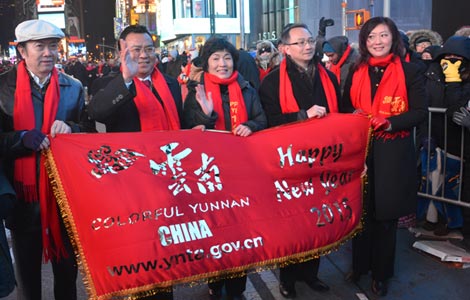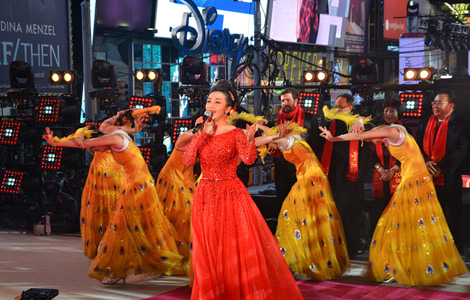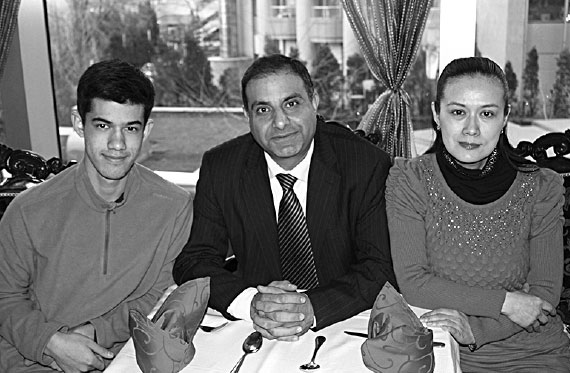Taste of India set to spread roots and flavor in China
Updated: 2015-01-01 07:53
By Mo Jingxi(China Daily USA)
|
||||||||
You could call it a gut feeling. It was certainly a taste for adventure. Mehernosh Pastakia was sitting down at a well-adorned table at his restaurant in the China Overseas Plaza in Jianguomen Wai Avenue, one of three in Beijing, recalling his decision to come to China in 1991.
A business venture in India had failed to get off the ground, but the then-24-year-old from Mumbai was undeterred and determined to prove he had the ability, and a menu, for success.
"I was disappointed at that time, so I said I will work abroad, and then go back and start again," Pastakia said.
|
Mehernosh Pastakia (middle), owner of the Taj Pavilion, poses with his wife Zheng Xiaowen and son Kershasp. Pastakia opened his first Taj in 1998 which is now a firm favorite for diners among the approximately 20 Indian restaurants in Beijing. Provided to China Daily |
All went according to plan, except for the return.
His Taj Pavilion, which regularly hosts visiting Indian politicians and business people while providing a taste of India for anyone residing in Beijing, has seen its customer numbers increase annually.
Pastakia has seen the proportion of Chinese customers grow from a modest 10 percent of the total initially to about 50 percent now.
His first Taj opened in 1998, and is a firm favorite for diners among the approximately 20 Indian restaurants in Beijing.
He is quick to point out that his Chinese wife played a pivotal role in his success.
"My wife is my backbone; she is the one who takes care of all the back office stuff while I take care of business at the front of the house," he said.
Pastakia met his wife Zheng Xiaowen soon after he arrived in Beijing and started to work as the manager of an Indian restaurant. She was then preparing for an English test in Beijing and working at the restaurant as a part-time accountant.
Zheng readily admits her motives were not romantic when she struck up conversation with the new arrival.
Cultural advantage
"At that time, there were only a few foreigners in Beijing, and there weren't many Chinese who could speak English. I thought it was a good opportunity to practice spoken English for my exams, so we talked a lot," Zheng said.
Pastakia and Zheng became close friends and then realized the spice of romance was in the air. Six years after meeting, they got married.
A year later, they opened the first Taj Pavilion in Beijing's central business district.
The couple spend most of their time operating the restaurants and plan to open more "if there is a good opportunity", Pastakia said.
Pastakia speaks Mandarin and understands the business and cultural advantage that it offers.
"If a Chinese guest comes in and you talk Chinese to them, they feel more at home, more relaxed," he said.
But back in the 1990s, cultural differences and Pastakia's few Mandarin phrases meant that Zheng's relatives did not immediately take to him.
In India, a guest eats the full amount on the plate to show respect to the host. In China, one should leave a small amount on the plate to show that you have eaten as much as you can.
"When I found I liked one of the dishes, I just kept eating, because I wanted them to be happy," Pastakia said. The more he ate the bigger trouble he was in.
However, both Pastakia and Zheng believed that culture, once the eating difficulty was overcome, actually brought them closer together.
"China and India both have cultures that value family ties," Pastakia said.
Zheng, a Buddhist, also has a deep knowledge and appreciation of India's culture.
The couple have a 14-year-old son, Kershasp, who was born and brought up in China, and Pastakia believes that his son will benefit immensely from the combination of the two cultures.
"He has the best of two countries in the world to draw on when he grows up," he said.
Real thing
It is rare for the family to cook at home, but if they do, Chinese cuisine, prepared by Zheng, appears most of the time.
Like most foreigners, Pastakia's favorite Chinese dish is kung-pao chicken, while his wife, a vegetarian, likes the lentil-based Indian dish, maaki dal.
Taj Pavilion customers tend to opt for the butter chicken, priced at 78 yuan ($12.50). This dish, coincidentally, is also one of the most popular Indian dishes globally.
Authenticity will never be sacrificed for more profit, Pastakia said, and the size of the restaurants allows the delicate flavors of Indian food to come through.
"It is better to get the real thing rather than a version, otherwise you will never know what is the real thing," he said.
Many shops in Beijing are now selling the ingredients, but when he started up they had to be imported.
During the interview, Tang Lu, a Chinese journalist who is going to work in India was having a farewell lunch with her colleagues.
"Have the dinner today and you will know exactly the best kind of Indian food I'm going to have there," she told them.
Despite the booming business, Pastakia is quite cautious about expansion plans.
"If you see the history of our restaurants, we wait at least five years before opening a new restaurant," he said. "The difficult part is not opening it but running it. It takes time for a restaurant to settle down."
With Indian cuisine growing ever more popular, potential customers may ask him to reconsider the five-year plan.
mojingxi@chinadaily.com.cn
(China Daily USA 01/01/2015 page11)
- New Year's Eve celebration in Times Square
- Death toll from tropical storm rises to 35 in Philippines
- Female fighters in the battle against IS
- China launches frigate for Bangladesh navy
- Divers set to search for AirAsia wreckage after debris, bodies found
- Nurse becomes first Ebola victim diagnosed in Britain

 Happy New Year
Happy New Year
 Let the celebration begin
Let the celebration begin
 New Year's Eve celebration in Times Square
New Year's Eve celebration in Times Square
 Happy Yunnan Year from Times Square
Happy Yunnan Year from Times Square
 Creative colored drawings embrace New Year
Creative colored drawings embrace New Year
 2014 Top news events in China
2014 Top news events in China
 Ten breakthroughs of China's military diplomacy in 2014
Ten breakthroughs of China's military diplomacy in 2014
 Chongqing collective wedding applies for Guinness records
Chongqing collective wedding applies for Guinness records
Most Viewed
Editor's Picks

|

|

|

|

|

|
Today's Top News
36 killed, 47 injured in Shanghai stampede
US sorghum exports to China hit 19-year high
China's Fosun moves into US insurance market
NYC to rename streets for slain policemen
Shares of CNR, CSR surge after merger
Fosun to buy Meadowbrook Insurance for about $433m
Doyers Street: Hallowed ground in New York's Chinatown
35 killed, 43 injured in Shanghai stampede
US Weekly

|

|






